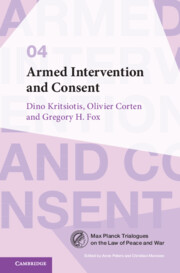Contents
Introduction: Principle and Practice of Armed Intervention and Consent
1.Intervention and the Problematisation of Consent
2.Intervention by Invitation: The Expanding Role of the UN Security Council
II.Counter-Intervention: The Saudi-Led Intervention in Yemen
III.The Fight against International Terrorism: The War against ISIL in Iraq and Syria
A.The Existing Legal Framework: Self-Determination and the Fight against International Terrorism
B.Invocation of the Fight against International Terrorism in the Iraqi and Syrian Context
C.Problems Raised by the Invocation of the Fight against International Terrorism in the Iraqi and Syrian Context
D.The Decisive Role of the UN Security Council in the Iraqi and Syrian Context
IV.Repression of Secession? The French-Led Intervention in Mali
V.Protection of Democracy? The ECOWAS Intervention in The Gambia
3.Invitations to Intervene after the Cold War: Towards a New Collective Model
Conclusion: Half-Hearted Multilateralisation of a Unilateral Doctrine

